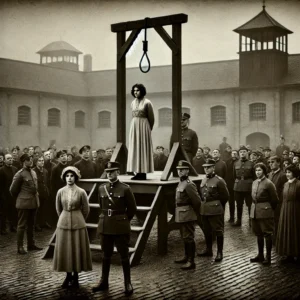 On July 13, 1955, Ruth Ellis was executed by hanging in the United Kingdom, marking the end of an era as she became the last woman to be put to death for murder in the country. Her execution took place at Holloway Prison in London, following her conviction for the murder of her lover, David Blakely. The case garnered significant media attention due to the sensational nature of the crime and Ellis’s status as a nightclub hostess, which added a layer of intrigue and public fascination. Despite her confession to the crime, the circumstances surrounding her actions and her emotional state at the time sparked widespread debate and sympathy.
On July 13, 1955, Ruth Ellis was executed by hanging in the United Kingdom, marking the end of an era as she became the last woman to be put to death for murder in the country. Her execution took place at Holloway Prison in London, following her conviction for the murder of her lover, David Blakely. The case garnered significant media attention due to the sensational nature of the crime and Ellis’s status as a nightclub hostess, which added a layer of intrigue and public fascination. Despite her confession to the crime, the circumstances surrounding her actions and her emotional state at the time sparked widespread debate and sympathy.
The execution of Ruth Ellis ignited considerable public controversy and intensified the existing debate over the use of capital punishment in the UK. Many people viewed her death sentence as overly harsh, particularly in light of the abusive relationship she endured with Blakely and the possible impact of her mental state on her actions. The public outcry was further fueled by the perception that her trial had been conducted with a lack of sensitivity to these mitigating factors. The case highlighted the often arbitrary and inequitable application of the death penalty, leading to a growing chorus of voices calling for its abolition.
Ellis’s case played a pivotal role in the movement toward the abolition of the death penalty in the UK. It became a symbol of the potential injustices inherent in capital punishment and galvanized public and political support for reform. The growing momentum for change culminated in the passing of the Murder (Abolition of Death Penalty) Act 1965, which largely abolished the death penalty for murder in the UK. Ruth Ellis’s tragic end thus became a turning point in British legal history, contributing to the eventual elimination of capital punishment and underscoring the need for a more humane and just criminal justice system.
